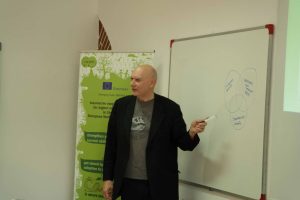
It’s my last few weeks at my desk on Streatham Campus at the University of Exeter, having led a team of staff developers for the past seven years and worked in staff development, one way or another, for 30 years or so.
What have I learned during this time?
Wearing hats
If I think about the bigger picture of how my career has evolved and how I have survived the changes and mood swings of one organisation, my main point would be that I’ve had to be comfortable to wear many different hats. While hair-loss might be one contributor to literal hat wearing, figuratively, I have made a conscious effort to reinvent myself whenever I have needed to.
I come from an academic background and as an academic I had a very single focus: my subject area (insects and their ecology). It was my whole existence and permeated all aspects of my life at “work” and at home, all year-round. Consequently, to continue the metaphor, I mostly wore one very big hat!
Changing perspectives
Starting an academic career in the late 1980s was a bad idea: my subject area was starved of funding and by 1992 it was too much of a struggle to survive with a young family on the way, so I swapped hats and took a move into Professional Services, using my technical skills as a bridge.
I quickly discovered one hat of one size was no longer sufficient. I might be able to teach people how to use a computer, but I also had to understand that they were now customers not students, so the expectation was somewhat different, extending well beyond what I was saying to them in the classroom. What I was helping them with would potentially affect their work and their entire career.
I struggled to get to grips with not being an “expert” in my field: it was far too large an area to be knowledgeable and skilful in everything and I had to work to overcome a constant feeling of inadequacy.
I was also frustrated that colleagues who clearly wanted to learn, didn’t know where to start. So different from students who turned up, completed a module, came to tutorials and moved on. Interested in how best to help my new learners, I became involved with the Staff Development Unit (SDU), the first step in my long and hugely enjoyable journey to today.
Tools, tricks and tips
My friends in the SDU naturally didn’t have all the answers but they introduced me to a different world: facilitation rather than teaching; workshops rather than tutorials; action learning and coaching rather than expert discourse; and needs analysis rather than second-guessing. There were so many more tools, models and principles that I now had to help me be a better IT trainer, technical manager and service provider.
So began my beautiful relationship with staff development! At first this was an adjunct to my main role then, in 2007, I had to change my collection of hats once again when my IT job was re-structured out of existence, and I was “placed” into a junior staff development role.
It was then that I learned that everything I had experienced in IT was also the doom of the staff developer:
- To wear many hats of many sizes depending on what you need (or are being asked) to do
- To have to judge what’s the best fit at any one time to enable you to provide what’s best for the individual, team or organisation, often without any proper governance (so it feels like you are making it up as you go along).
- To do your best in every area but to worry that you are never “the expert” and to be constantly challenged on this (including being asked “have you talked to the experts in the Business School?” grrrrr…).
Everything, everywhere, all at once
In 2008 I gave a presentation at the SDF national conference titled “Quadrophenia – reflections of an early career staff developer”. In this I revealed the strange mix of personae that I had experienced coming into my new role: trainer, facilitator, project manager, accountant, designer, paper-writer, business-planner, policy-maker, coach, mentor, adviser and probably a few others along the way. I also quickly realised that there was (and still is), an expectation that a staff developer will be competent across this range, probably at a level far exceeding their pay grade in many instances!
Being sociable
My last learning point is the one that has made my work so enjoyable and fulfilling. I am sure I would have been “OK” as a staff developer if I’d hunkered down, learned the trade better and just did what I was asked to do. That, however, is not my way. I have been too curious, rather nosy, and fascinated with (and often envious of) what everyone else is doing: how did they make that stick; what were they doing that worked so well; what on earth was that new resource/model/tool all about?
So, this is where you come in to my story
I have loved and thrived off the people I have met and worked with along the way. I’ve had a habit of volunteering for things like a puppy eager for attention, and sometimes it’s been hard to make it all work, but usually, in one shape or form it has, thanks to collaborative effort and teamwork.
“Give and you get back” has always been my unconscious motto: from helping at conferences and on the SDF to just talking to colleagues and going to see them (and probably bore them with drunken stories over a few beers). So, if you have suffered me over the years, sober or not, THANK YOU!
Time to go!
I don’t know what I’ll be doing next, only that whatever I do I will aim to stay nosy, curious, excited and amazed at the world in which we live, and try to be the best citizen and steward of it all that I can.
Thank you everyone for everything!
Clive Betts
Head of People Development, University of Exeter (2017-2024)
Chair, South Wales & SW England Staff Development Group (2017-2024)
SDF Treasurer (2009-2012)
